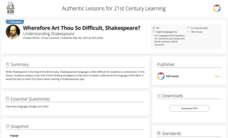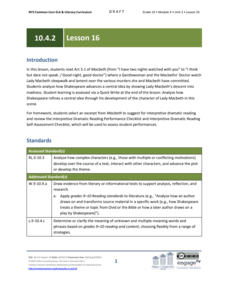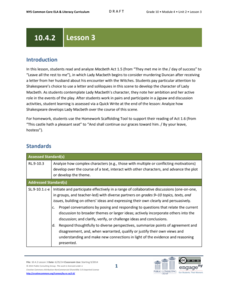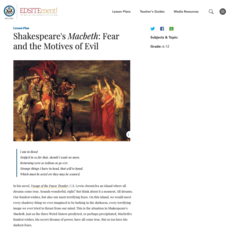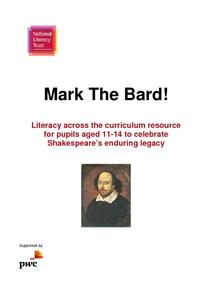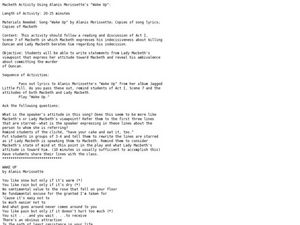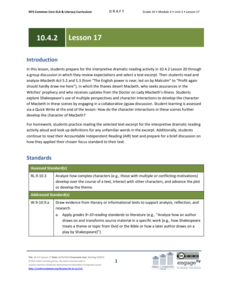National Endowment for the Humanities
Shakespeare's Macbeth: Fear and the "Dagger of the Mind"
High schoolers read and analyze Shakespeare's play, 'Macbeth.' They analyze how Shakespeare uses metaphors, imagery and dramatic cues to demonstrate Macbeth's response to fear, and perform without words a scene dramatizing Macbeth's...
Curated OER
Macbeth News Broadcast
Here is an authentic assessment task for Shakespeare's Macbeth. Young literature scholars prepare, perform, and record a news broadcast about the major events in the play. For example, groups may choose to report on the death of Lady...
Shakespeare Uncovered
“Speak, I Charge You”: Macbeth On Your Feet, Not In Your Seat
“Is this a dagger which I see before me . . .” As part of a study of Macbeth, class members engage in a series of activities that get them up and moving. Individuals practice, then deliver, a line from the Scottish play. The entire class...
PBS
Supernatural Shakespeare and Macbeth
"A drum, a drum! Macbeth doth come." The withered and wild witches of Shakespeare’s Scottish play launch an examination of the fantastical elements in Act I, scene iii, paying particular attention to the action, imagery,...
K20 LEARN
Wherefore Art Thou So Difficult, Shakespeare? Understanding Shakespeare
'Tis not easy to understand the language of the Bard! But, hark! Fret not! With the assistance of this joyous lesson, young players learn how to translate Shakespeare's English into modern language. Groups examine passages from Julius...
Curated OER
Analyzing Atmosphere: Macbeth Murder Scene and Dagger Speech
Shakespeare's Macbeth (Act II, Scenes I and II) lacks explicit details of the murder of King Duncan, yet the author creates an atmosphere that allows us to visualize the event. Readers interpret the "Dagger Speech" by writing stage...
EngageNY
Grade 10 ELA Module 4: Unit 2, Lesson 16
How do complex characters develop throughout a text? Pupils read Act 5.1 from Shakespeare's Macbeth, which depicts Lady Macbeth's descent into madness. Using discussion and writing exercises, scholars analyze how Shakespeare develops...
EngageNY
Grade 10 ELA Module 4: Unit 2, Lesson 10
Is it better to be dead than to "dwell in doubtful joy," as Lady Macbeth suggests in Act 3.2 of Shakespeare's Macbeth? Using the resource, scholars work in small groups to discuss how Lady Macbeth and Macbeth begin to unravel following...
EngageNY
Grade 10 ELA Module 4: Unit 3, Lesson 5
Would Machiavelli consider Macbeth a successful ruler? Scholars ponder the intriguing question, demonstrating their knowledge of Shakespeare's Macbeth and Machiavelli's The Prince. They collaborate with peers to share their opinions,...
EngageNY
Grade 10 ELA Module 4: Unit 2, Lesson 3
How does Lady Macbeth's ambition help advance the plot of Shakespeare's Macbeth? Scholars explore the topic using discussion and a jigsaw activity. Next, they complete a quick write to analyze how Shakespeare develops Lady Macbeth's...
National Endowment for the Humanities
Shakespeare's Macbeth: Fear and the Motives of Evil
Students use an online search engine (or a printed concordance) to locate passages that highlight Macbeth's response to fear and his descent into evil. They analyze the motives of Macbeth's increasingly desperate and evil actions.
Curated OER
Exploring the Expository Scenes in Macbeth
Students examine the function of exposition in play structure. They will be able to develop multiple interpretations and visual and aural production choices for Shakespearean scenes and choose those that are most interesting.
Literacy Design Collaborative
Macbeth: Influence of Supernatural
Something wickedly wonderful this way comes in a lesson that focuses on Macbeth. After a close reading of the play, class members craft a literary analysis essay in which they use evidence from the text to show how Shakespeare uses the...
National Literacy Trust
Mark The Bard!
Commemorate the 400th anniversary of Shakespeare's death with a packet of cross-curricular literacy lessons and activities centered around two of the Bard's most popular plays, Macbeth and The Tempest. Class members look for evidence of...
Curated OER
MacBeth Activity Using Alanis Morissette's "Wake Up"
Students analyze Macbeth through the lens of a pop song. In this Macbeth lesson plan, students read Act I, Scene 7 of Macbeth and determine Lady Macbeth's viewpoint. Students read the lyrics to Alanis Morrissette's song 'Wake Up' and...
Curated OER
Hamlet Research Paper: Find, Evaluate, and Select Appropriate Research Sources
Help young researchers find credible sources online. Modeling with a Google search for information about Shakespeare’s Macbeth, use a computer projector or Smart Board to show class members how weak the top three search results are....
Curated OER
When Shall We Three Meet Again?
Double, double toil and trouble; Fire burn, and caldron bubble. Macbeth’s witches provide young actors an opportunity to try their hand at small ensemble acting. Using Act I, scene I of Shakespeare’s play, groups of three take turns...
EngageNY
Grade 10 ELA Module 4, Unit 2, Lesson 22
The Witches, Lady Macbeth, or Macbeth himself: who is the culprit? Using the resource, pupils craft multi-paragraph essays to present arguments about which character is responsible for the tragedy in Shakespeare's Macbeth. Additionally,...
EngageNY
Grade 10 ELA Module 4: Unit 2, Lesson 5
When Macbeth says, "Nature seems dead," he uses personification. Using the resource, scholars complete a Quick Write to analyze the impact of figurative language on the mood of Shakespeare's Macbeth. Pupils also participate in an...
EngageNY
Grade 10 ELA Module 4: Unit 2, Lesson 12
How do the Three Witches' interactions with Macbeth advance the plot of Shakespeare's Macbeth? Learners complete a Quick Write to answer the question. They also participate in a whole-class dramatic reading of Act 4.1.
EngageNY
Grade 10 ELA Module 4: Unit 2, Lesson 17
Madness, violence, despair—the titular character of Shakespeare's Macbeth is spiraling out of control. Pupils first explore the topic with a collaborative jigsaw discussion. At the end of the instructional activity, they write about how...
EngageNY
Grade 10 ELA Module 4: Unit 2, Lesson 19
A tragic play includes imperfect heroes, pity and fear, and a fatal flaw. Scholars analyze Shakespeare's Macbeth as an example of the tragedy genre. Pupils demonstrate understanding by completing a Quick Write discussing how Shakespeare...
EngageNY
Grade 10 ELA Module 4, Unit 2, Lesson 25
How do film adaptations differ from their literary counterparts? Scholars watch and analyze the 2011 Royal Shakespeare Company (RSC) production of Shakespeare's Macbeth. Pupils complete a Quick Write analyzing how the RSC production...
EngageNY
Grade 10 ELA Module 4: Unit 2, Lesson 7
One sentence, so much meaning. Scholars analyze a quote from Act 2.3 of Shakespeare's Macbeth and explore the plot in a jigsaw discussion.
Other popular searches
- Macbeth Shakespeare
- Shakespeare Macbeth Act 5
- Shakespeare and Macbeth Art
- Shakespeare Macbeth Language
- Shakespeare Macbeth Research
- Macbeth Shakespeare Unit
- Macbeth by Shakespeare






